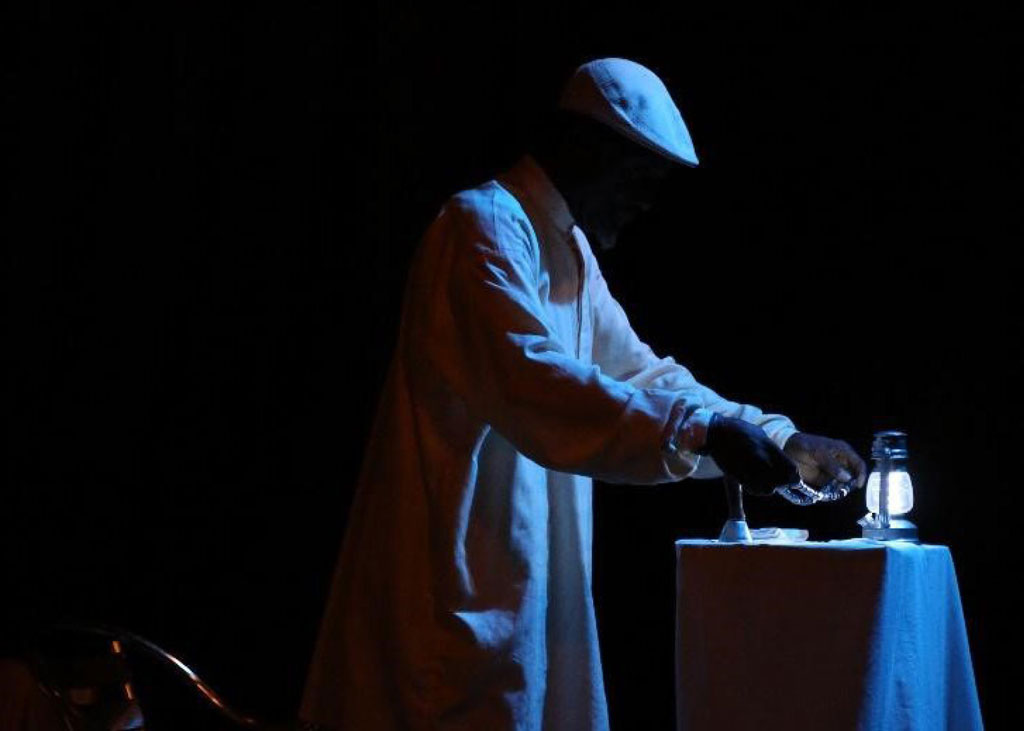The Slow Integration of Sustainability into Contemporary Theatre and Performance Practices in Cameroon
DOI:
https://doi.org/10.7146/peri.v19i37.135191Resumé
The Cameroonian theatre landscape, both Anglophone and Francophone, is not left untouched by current concerns and discourses about climate change, ecological degradation, and particularly environmental/natural sustainability. In this article, we will examine the emerging inclusion of sustainability in theatre and performances in Cameroon. Specifically, we will discuss the ways in which choices of costumes, makeup, stage props, and occasionally thematics reflect and seek to promote the sustainable management of Nature. Methodologically, we will employ data gathered from five current theatre troupes in Cameroon, interviews conducted with some theatre directors and practitioners, and the personal experiences of (some) co-authors who are also theatre practitioners. We will begin by discussing some unsustainable practices that characterised much of previous Cameroonian theatrical performances and then proceed to present the evolution of the situation, especially as demonstrated in the choices and deployment of costumes, makeup, stage props, and thematics in a selection of theatre performances and theatre scripts. In this way, we hope to highlight the contribution of Cameroonian theatre towards ensuring a just and sustainable planet Earth for all.
Referencer
Ayang, F. E., 2012. Green Hills: A Play on Environmental Protection. Awah Publishers.
Betoko, A. M.-T., 2010. Le théâtre populaire francophone au Cameroun: (1970 - 2003) - Langage
– Société - Imaginaire. L’Harmattan.
Butake, B., 1988. “Play Production in Cameroon.” In B. Butake and G. Doho (eds.), Théâtre
camerounais, Cameroon theatre: Actes du Colloque de Yaoundé, pp. 236–246. BET.
Byam, L. D., 1999. Community in Motion: Theatre for Development in Africa. Bergin and
Garvey.
Diakhaté, O. and Eyoh, H. D., 2017. “The Roots of African Theatre Ritual and Orality in the Pre-
Colonial Period.” Critical Stages: The IATC Journal – June 2017, No. 15, (https://www.critical-stages.org/15/tag/by-ousmane-diakhate-and-hansel-ndumbe-eyoh/) (accessed 28 June 2022).
Doho, G., 2006 [2002]. People Theater and Grassroots Empowerment in Cameroon (trans.
Marie Lathers). Africa World Press.
Funfe, A. G., 2011. “Theatre: Panacea for HIV/AIDS Education in Cameroon?” MPhil
Dissertation.
Harrow, K. W., 1982. “Cameroonian Theater: The Dialectic of Modern and Traditional.” The
French Review, 55(6), pp. 846–854, (http://www.jstor.org/stable/390651) (accessed 28 June 2022).
Howlround Theatre Commons, 2020. “Segal Talks: Edouard Elvis Bvouma and Hermine Yollo,
An Update on the Situation for Theatre Artists in Cameroon.” 15 May 2020, (https://howlround.com/happenings/segal-talks-edouard-elvis-bvouma-and-hermine-yollo) (accessed June 28 2022).
Inyang, E., 2016. “Community Theatre as Instrument for Community Sensitisation and
Mobilisation.” Tydskrif vir Letterkunde, 53(1), pp. 49-159.
Inyang, E., 2015. “Theatre for the Sensitisation and Mobilisation of Local Communities for
Conservation: Lessons from the Bayang-Mbo Wildlife Sanctuary in Southwest Cameroon.” In: N. Alembong, O. C. Labang and E. F. Fombele (eds.), Ecocultural Perspectives: Literature and Language (pp. 293-310). Ken Scholars Publishing.
Kamlongera, C., 2005. “Theatre for Development in Africa.” In: O. Hemer and T. Tufte (eds.),
Media and Global Change: Rethinking Communication for Development (pp. 435-452). Nordicom and Clacso.
Kom, A., 1998. “Théâtre et censure au Cameroun.” Matatu, 26 April 1998,
(https://brill.com/view/journals/mata/20/1/article-p169_12.xml?ebody=previewpdf-49929) (accessed 30 June 2022).
Kouma, C. M., 1974. “Interview de Mme Charlotte Mbarga Kouma.” Les interviews d’Amina,
September 1974 (AMINA Mbarga Kouma (uwa.edu.au) ) (accessed 30 June 2022).
Lamko, K., 2003. “Émergence difficile d’une théâtre de la participation en Afrique noire
francophone.” PhD dissertation.
Ngomssi, R. P. N., 2013. “Théâtre et cinéma pour le développement au Cameroun: production,
promotion et diffusion.” Master dissertation.
Ngwang, E. and Usongo, K., 2016. Art and Political Thought in Bole Butake. Lexington Books.
Nsah, K. T., 2021a. “The Ecopolitics of Water Pollution and Disorderly Urbanization in Congo-
Basin Plays.” Orbis Litterarum (pre-issue), 6 September 2021, (https://doi.org/10.1111/oli.12323) (accessed 28 June 2022).
Nsah, K. T., 2021b. “Can Literature Save the Congo Basin? Postcolonial Eccocriticism and
Environmental Literary Activism.” PhD dissertation.
Nsah, K. T., 2018. “‘No Forest, No Water. No Forest, No Animals.’: An Ecocritical Reading of
Ekpe Inyang’s The Hill Barbers.” Ecozon@ 9(1), pp. 94-110, (https://doi.org/10.37536/ECOZONA.2018.9.1.1581) (accessed 29 June 2022).
Omotorhe, O. C., n.d.. “Understanding Traditional African Drama and Theatre.”
Motivation.Africa, (https://www.motivation.africa/understanding-traditional-african-drama-and-theatre.html) (accessed 30 June 2022).
Thomsen, C., 2013. “Sustainability (World Commission on Environment and Development
Definition).” In S.O. Idowu, N. Capaldi, L. Zu, A.D. Gupta, (eds) Encyclopedia of Corporate Social Responsibility. Springer. https://doi.org/10.1007/978-3-642-28036-8_531.

Downloads
Publiceret
Citation/Eksport
Nummer
Sektion
Licens
Det følgende vedrører alle Peripeti-udgivelser fra 2024, nr. 39, og senere:
Peripeti er et Diamond Open Access-tidsskrift, der giver direkte open acces til publiceret indhold ud fra princippet om, at det at gøre forskning frit tilgængelig for offentligheden understøtter en større global udveksling af viden.
Forfattere skal ikke betale for indsendelse, redigering eller offentliggørelse af artikler.
Forfattere, der bidrager til Peripeti, bevarer ophavsretten til deres artikler.
Forfattere accepterer at udgive artikler under en Creative Commons CC-BY-NC 4.0-licens. Vilkårene for denne licens tillader brugere frit at kopiere og videredistribuere materialet i ethvert medie eller format og at tilpasse, transformere og bygge videre på materialet, så længe der gives passende kreditering, et link til licensen gives, og eventuelle ændringer angives. Brugere må ikke dele eller tilpasse materialet til kommercielle formål uden samtykke fra licensgiveren. Brugen af licensen må ikke på nogen måde antyde, at licensgiveren støtter tredjeparten eller dennes brug. Licensen kan ikke tilbagekaldes.
Forfattere opfordres til at lægge deres artikler ud på personlige og/eller institutionelle hjemmesider for at sikre endnu større offentlig adgang efter udgivelsen. Forfattere har ret til at arkivere deres artikler i fondes og offentlige institutioners arkiver, men Peripeti anmoder om, at forfattere bruger et direkte link til den publicerede artikel på tidsskriftets hjemmeside, når det er muligt, da Peripeti som en ikke-kommerciel, offentligt finansieret udgiver er afhængig af niveauet af brugeraktivitet på tidsskriftets hjemmeside.
Vedrørende tidligere udgivelser, indtil 2024, herunder nr. 38:
Ophavsretten deles mellem Peripeti og forfatteren/forfatterne. Tidsskriftet er et open access-tidsskrift, der giver direkte adgang til alt indhold baseret på princippet om, at det at gøre forskning frit tilgængelig for offentligheden understøtter en større global udveksling af viden. Brugere kan frit kopiere og dele materiale i ethvert medie eller format, så længe der gives passende kreditering. Enhver anden brug kræver skriftligt samtykke fra indehaverne af ophavsretten.




